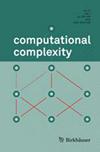Smooth and Strong PCPs
IF 1
3区 计算机科学
Q3 COMPUTER SCIENCE, THEORY & METHODS
引用次数: 10
Abstract
Probabilistically checkable proofs (PCPs) can be verified based only on a constant amount of random queries, such that any correct claim has a proof that is always accepted, and incorrect claims are rejected with high probability (regardless of the given alleged proof). We consider two possible features of PCPs: $$\circ \quad$$ ∘ A PCP is strong if it rejects an alleged proof of a correct claim with probability proportional to its distance from some correct proof of that claim. $$\circ \quad$$ ∘ A PCP is smooth if each location in a proof is queried with equal probability. We prove that all sets in $$\mathcal{NP}$$ NP have PCPs that are both smooth and strong, are of polynomial length and can be verified based on a constant number of queries. This is achieved by following the proof of the PCP theorem of Arora et al. (JACM 45(3):501–555, 1998), providing a stronger analysis of the Hadamard and Reed–Muller based PCPs and a refined PCP composition theorem. In fact, we show that any set in $$\mathcal{NP}$$ NP has a smooth strong canonical PCP of Proximity (PCPP), meaning that there is an efficiently computable bijection of $$\mathcal{NP}$$ NP witnesses to correct proofs. This improves on the recent construction of Dinur et al. (in: Blum (ed) 10th innovations in theoretical computer science conference, ITCS, San Diego, 2019) of PCPPs that are strong canonical but inherently non-smooth. Our result implies the hardness of approximating the satisfiability of “ stable ” 3CNF formulae with bounded variable occurrence , where stable means that the number of clauses violated by an assignment is proportional to its distance from a satisfying assignment (in the relative Hamming metric). This proves a hypothesis used in the work of Friggstad, Khodamoradi and Salavatipour (in: Chan (ed) Proceedings of the 30th annual ACM-SIAM symposium on discrete algorithms, SODA, San Diego, 2019), suggesting a connection between the hardness of these instances and other stable optimization problems.平滑和强大的pcp
概率可检验证明(pcp)只能基于一定数量的随机查询进行验证,这样,任何正确的声明都有一个始终被接受的证明,而不正确的声明很可能被拒绝(无论给定的声称的证明是什么)。我们认为PCP有两个可能的特征:$$\circ \quad$$∘PCP是强的,如果它拒绝一个声称是正确证明的证据,其概率与该说法与某个正确证明的距离成正比。$$\circ \quad$$如果以相同的概率查询证明中的每个位置,则PCP是平滑的。我们证明了$$\mathcal{NP}$$ NP中的所有集合都具有平滑和强的pcp,它们是多项式长度的,并且可以基于常数次查询来验证。这是通过遵循Arora等人的PCP定理的证明来实现的(JACM 45(3):501 - 555,1998),提供了对Hadamard和Reed-Muller基于PCP的更强分析以及改进的PCP组成定理。事实上,我们证明了$$\mathcal{NP}$$ NP中的任何集合都有一个光滑的强规范PCP的邻近性(PCPP),这意味着存在一个有效的可计算的$$\mathcal{NP}$$ NP见证的双射来正确证明。这改进了Dinur等人最近构建的ppps(参见:Blum(主编)在理论计算机科学会议上的第10次创新,ITCS,圣地亚哥,2019),这些ppps是强规范的,但本质上是不光滑的。我们的结果暗示了近似具有有界变量出现的“稳定”3CNF公式的可满足性的难度,其中稳定意味着分配违反的子句数与它与满足分配的距离成正比(在相对汉明度量中)。这证明了Friggstad、Khodamoradi和Salavatipour的工作中使用的一个假设(见:Chan(主编)第30届ACM-SIAM离散算法研讨会论文集,SODA,圣地亚哥,2019),表明这些实例的难度与其他稳定优化问题之间存在联系。
本文章由计算机程序翻译,如有差异,请以英文原文为准。
求助全文
约1分钟内获得全文
求助全文
来源期刊

Computational Complexity
数学-计算机:理论方法
CiteScore
1.50
自引率
0.00%
发文量
16
审稿时长
>12 weeks
期刊介绍:
computational complexity presents outstanding research in computational complexity. Its subject is at the interface between mathematics and theoretical computer science, with a clear mathematical profile and strictly mathematical format.
The central topics are:
Models of computation, complexity bounds (with particular emphasis on lower bounds), complexity classes, trade-off results
for sequential and parallel computation
for "general" (Boolean) and "structured" computation (e.g. decision trees, arithmetic circuits)
for deterministic, probabilistic, and nondeterministic computation
worst case and average case
Specific areas of concentration include:
Structure of complexity classes (reductions, relativization questions, degrees, derandomization)
Algebraic complexity (bilinear complexity, computations for polynomials, groups, algebras, and representations)
Interactive proofs, pseudorandom generation, and randomness extraction
Complexity issues in:
crytography
learning theory
number theory
logic (complexity of logical theories, cost of decision procedures)
combinatorial optimization and approximate Solutions
distributed computing
property testing.
 求助内容:
求助内容: 应助结果提醒方式:
应助结果提醒方式:


